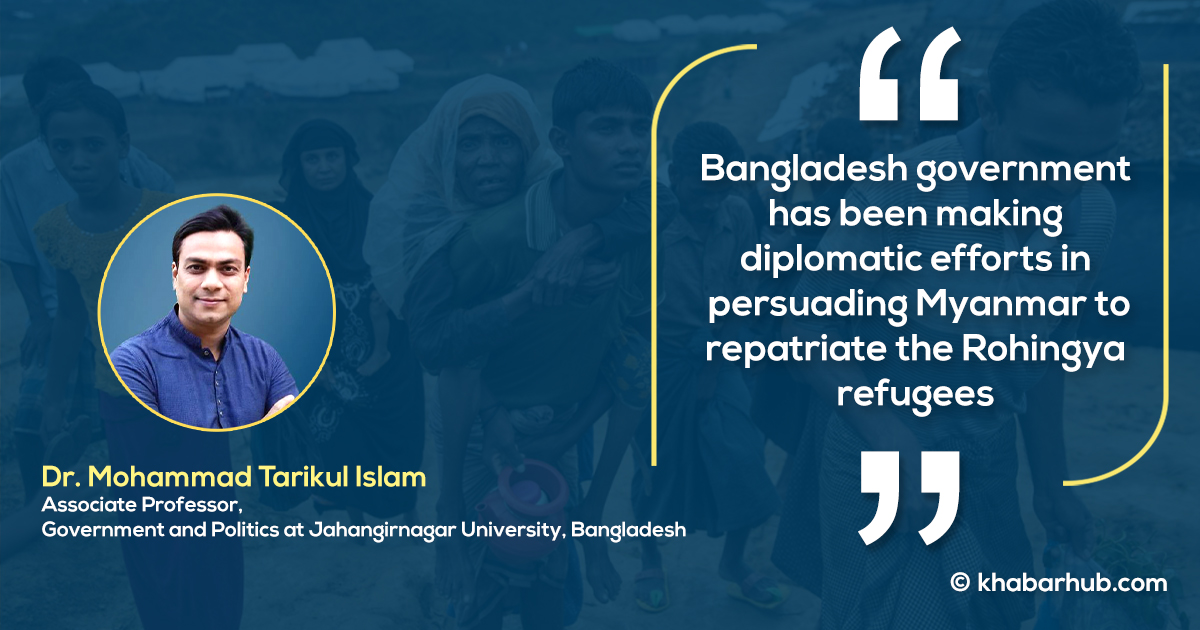0%

In its 43rd session, the UNHRC has adopted the resolution on 22 June 2020 by a vote of 37 in favor, 2 against and 8 abstentions, calling upon Myanmar to ensure voluntary, safe and dignified return of Rohingya refugees.
Due to persecution, the Rohingya, an ethnic minority group in Myanmar crossed into neighboring Bangladesh over decades, laying uneven pressure on the scarce resources of Bangladesh.
Bangladesh is apparently hosting around one million Rohingya refugees. Myanmar government has been very reluctant to take back its nationals, the Rohingya, despite the robust diplomatic endeavors of the Bangladesh government regarding repatriation.
Given their living space mostly located in Teknaf-Cox’s Bazar areas, the refugee earmarked areas are adjacent to the settlements of the local citizens.
Once, many awkward incidences happened between them causing law and order situations. Security concern particularly non-conventional (human security), is another challenge that Bangladesh is already facing and it will intensify further in the future with the influx of the Rohingya refugees over the years.
Bangladesh’s government has been accredited for providing them with various facilities, including shelter, food and medical care despite many limitations.
Though Myanmar holds no major importance in Russian policy – no geopolitical interests are at stake there, while Moscow’s attitude to the issue in the UN could potentially upset its Muslim allies, for instance, Iran.
To address the risks of a potential outbreak of coronavirus in the camps, the Government of Bangladesh, together with UNHCR and partners, has ensured the inclusion of Rohingya refugees in its national response.
Bangladesh is professionally making every effort to harness regional and global power to end in an amicable solution of this emerging crisis despite the position of China and India on the side of Myanmar on the Rohingya issue.
We have noticed both countries are having a huge strategic and economic interest in Myanmar. Even Russia seems compassionate to Myanmar on this issue.
Bangladesh’s government has been experienced over the months while unveiling its diplomatic efforts in persuading Myanmar to repatriate the refugees.
Like the past, the Bangladesh government has kept its efforts to continue to encourage other governments to stay engaged and continue to address the pressing needs of these refugees — needs that will only grow as long as this situation remains unresolved.
However, the reality suggests that the Bangladesh government may not succeed in sending all of them back even in a single go with the utmost diplomatic niche.
Though Myanmar holds no major importance in Russian policy – no geopolitical interests are at stake there, while Moscow’s attitude to the issue in the UN could potentially upset its Muslim allies, for instance, Iran.
The international community believes; only harmonious returns can break the decades-long cycle of displacement the Rohingya community is experiencing.
The Memorandum of Understanding (MoU) signed in 2018 between the Government of Myanmar, UNHCR and UNDP are intended to ensure that refugees receive information on the situation in their places of origin and this MoU keeps a provision allowing Rohingya refugees to visit their home villages and other areas where they may choose to return.
Moreover, to help Myanmar create conditions favorable for the Rohingyas to return, the UNDP and UNHCR signed a tripartite deal with Myanmar in June 2018, nearly a year after 740,000 Rohingyas fled military atrocities in Rakhine, which was described as having “genocidal intent” by UN independent investigators.
The official visit of the Prime Minister of Bangladesh in early July 2019 to China was productive as China assured Bangladesh to stand beside Bangladesh in the repatriation of the Rohingyas.
Even China expressed its interest to help Bangladesh in resolving the Rohingya crisis by convincing the Myanmar government and its leaders through bilateral discussions.
The second attempt to start repatriation of Rohingyas to Myanmar on 22 August 2019 was turned out to be futile, as no refugees showed a willingness to go back to Arakan.
They have again demanded their citizenship with the right to freedom of movement and access to all opportunities.
UN at the same time must enforce the recommendation of the Annan Commission by imposing diplomatic force on Myanmar.
British drafted resolution was in support of Bangladesh as it had warned that the 15-member Security Council could consider further steps, including sanctions, if there was not enough progress made by Myanmar for repatriation.
Like the past, the Bangladesh government has kept its efforts to continue to encourage other governments to stay engaged and continue to address the pressing needs of these refugees — needs that will only grow as long as this situation remains unresolved.
South Asian countries must show solidarity with Bangladesh and to support Myanmar to start creating conditions for the voluntary, safe and dignified return of Rohingya refugees.
We urge upon the Government of Myanmar to take urgent action to address the root causes of the crisis which have persisted for decades so that people are no longer forced to flee and the refugees can eventually return home in safety and dignity.
UN at the same time must enforce the recommendation of the Annan Commission by imposing diplomatic force on Myanmar.
UN Security Council should initiate a visit to the Rohingya refugee camps to force the government of Myanmar for setting up “safe zones” for people of all backgrounds in conflict-torn parts of Myanmar as proposed by Prime Minister of Bangladesh.
(Dr. Mohammad Tarikul Islam is an Associate Professor of Government and Politics at Jahangirnagar University, Bangladesh)